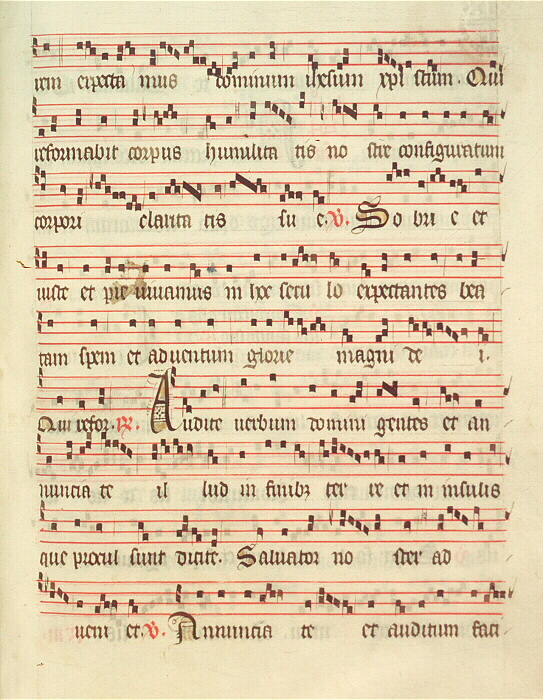Canto ambrosiano, Avvento, Responsorio AUDITE VERBUM, Schola Gregoriana Mediolanensis, Giovanni Vianini, Milano, Italia - YouTube
That's an Ambrosian Chant version of the Advent Responsory, Audite verbum.
Here's something about this Responsory from the 1918 book, Liturgica historica: papers on the liturgy and religious life of the Western church, available in full at the Google Books link. (Psst, Derek: It looks like quite a good resource!)
The translation found at Divinum Offocium for this Responsory (along with the entire service of Matins - another good resource) is:
The Medieval Music Database has a page on this responsory, as well, along with a page from The Poissy Antiphonal. This is a different tune, though:

That's an Ambrosian Chant version of the Advent Responsory, Audite verbum.
Here's something about this Responsory from the 1918 book, Liturgica historica: papers on the liturgy and religious life of the Western church, available in full at the Google Books link. (Psst, Derek: It looks like quite a good resource!)
At the end of each lesson for matins, i. e. the night office, is a long responsory which, in its simplest form, is thus made up: first, a biblical text (or an adaptation of one), which is the 'responsory' in a strict sense; on which follows a 'verse', also from Scripture; and after that the second half (or part) of the preceding 'responsory'.
For instance, .... the responsory at the end of the eighth lesson at matins of the first Sunday of Advent:—Responsory: 'Audite verbum Domini gentes, et annuntiate illud in finibus terrae *. Et insulis quae procul sunt dicite: Salvator noster adveniet.' Verse: 'Annuntiate, et auditum facite: loquimini et clamate.' And then comes a repetition of the second half of the 'responsory' proper: * Et insulis quae procul sunt dicite: Salvator noster adveniet.' It is obvious that, with an arrangement of this kind, to be tolerable at all the ' verse' must be such that its last words, when followed by the second half of the 'responsory', will make sense and form a continuous phrase. But the authentic and native Roman method of singing these responsories knew no need for such clever dovetailings; for according to that Roman method the ' responsory' was simply repeated in its entirety after the 'verse'.
The translation found at Divinum Offocium for this Responsory (along with the entire service of Matins - another good resource) is:
R. Hear the word of the Lord, O ye nations, and declare it in the ends of the earth * And in the isles afar off, and say Our Saviour shall come.
V. Declare it and make it known, lift up your voice and cry aloud.
R. And in the isles afar off, and say Our Saviour shall come.
The Medieval Music Database has a page on this responsory, as well, along with a page from The Poissy Antiphonal. This is a different tune, though:







0 comments:
Post a Comment